Do Pistachios Help You Sleep?
They’re green. They’re delicious. But can they help you sleep? Pistachios are known for their vibrant green coloring, as well as their many health benefits. Pistachios are packed with antioxidants and nutrients including vitamin B6 and thiamine. They also deliver a healthy dose of protein, fiber, and other healthy fats.
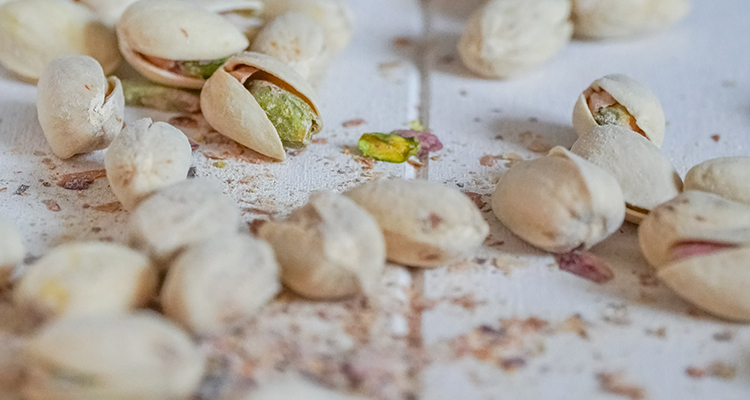
Sometimes mistaken for nuts, pistachios are actually seeds produced by the pistachio tree. They have a slightly sweet and earthy flavor. The more mature the pistachio, the stronger the flavor.
Did you know that these seeds aren’t just a delicious and nutritious snack but may also help you sleep better? In this article, we’ll answer the question, “Do pistachios help you sleep better?” If so, why? We’ll also share tips on incorporating them into your diet and which specific barriers to sleep these sweet and savory seeds can help you overcome.
Content
Do Pistachios Help You Sleep?
There’s no clear-cut answer to this question. Different foods, beverages, and natural supplements can help certain people achieve deeper, more restorative sleep or simply make it easier for them to fall asleep. That said, pistachios contain certain levels of the sleep hormone melatonin. For this reason, some people find that snacking on pistachios before bed reduces their sleep latency and may result in less frequent awakenings throughout the night.
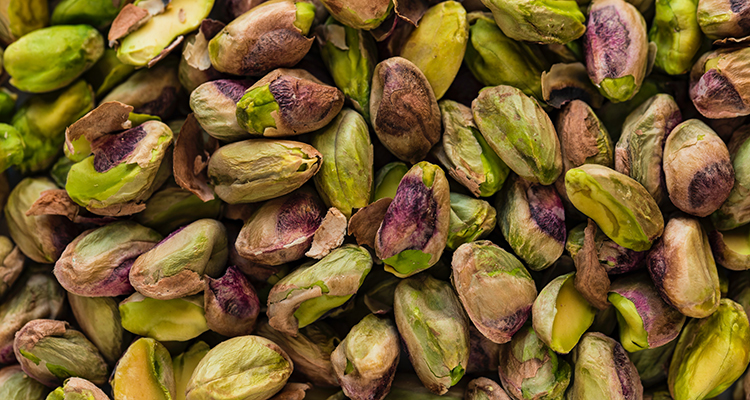
Melatonin helps regulate your body’s sleep-wake cycle. As night falls and you prepare for sleep, your brain naturally produces and releases melatonin, signaling your body that it’s time to go to sleep. As you age, your natural melatonin levels dip, which means it may become increasingly difficult to fall asleep or maintain a healthy sleep schedule. By increasing melatonin levels, you may be able to ease symptoms associated with both insomnia and other common sleep disorders.
But how much melatonin do pistachios actually contain and is it enough to make a difference in your sleep health? Several studies have determined that 100 grams of shelled pistachios (or 3.5 ounces) contain about 23 mg of melatonin. This is relatively high compared to other natural sources of melatonin and even melatonin supplements which, on average, only contain between .1 and 10 mg of melatonin per dose.
The American Pistachio Growers also conducted a study using two different methods and reported that raw and roasted pistachios only contained between .00034 and .066 mg of melatonin per 100-gram serving. These results indicate that more research is needed to determine exactly how much melatonin pistachios contain and if it’s enough to improve sleep quality.
This same study indicated that pistachios contain phenolics that can help reduce the breakdown of tryptophan in the body. Instead of turning into toxic compounds, pistachios help tryptophan convert into melatonin. This process can help reduce delayed sleep onset, while also improving sleep quality and duration. Tryptophan also triggers the release of serotonin, which is a neurotransmitter responsible for mood regulation. It helps your body handle emotional responses to stress, changes in mood, and appetite – all of which can poorly impact your sleep.
The Science Behind Pistachios and Sleep
The potential positive effects of pistachios on sleep don’t end with their ability to increase melatonin production. Research suggests that pistachios positively affect specific neurons in the brain responsible for sleep.
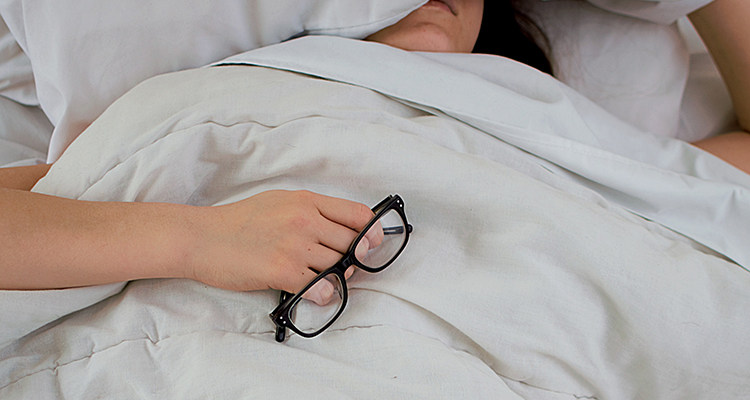
Your brain contains two different types of neurons – inhibitory and excitatory. When you’re awake, the flow of signals between these neurons is very high. That’s because external stimuli like light and noise put your brain on high alert as it works to keep you safe and vigilant about your surroundings. As night falls or you start to get sleepy, this flow of signals starts to slow down or may even become completely unresponsive. At this level, it makes it difficult for your brain to process anything from the outside, including lights, noise and other stimuli.
Inhibitory neurons send signals to your body to tell it to stop doing something, while excitatory neurons are responsible for action and send signals to your body to perform certain tasks. When these neurons are working in harmony, your body is balanced and functions properly. If this flow is disturbed or unbalanced, you may notice you feel anxious, depressed, or experience trouble sleeping. Melatonin (which is found in pistachios) works to keep this balance and achieve harmony between these neurons. Not only can this help you sleep better but it may ease feelings of anxiety and depression, which are two main causes of insomnia.
This balance of neurons also plays a role in how restorative your sleep is. When you sleep and your body’s at rest, your brain is hard at work processing all of the day’s events and working to consolidate information and memories. Without a natural flow of energy and signals between your inhibitory and excitatory neurons, this exchange and consolidation of information can’t happen. And without it, you’ll experience cognitive and memory issues.
The Other Amazing Benefits of Pistachios
Pistachio’s other nutrients and vitamins can also promote a healthy body weight, lower your blood sugar and cholesterol levels, improve your gut health and support healthy blood vessels. All of which reduce your risk of developing other health complications that may interfere with your ability to achieve quality sleep.
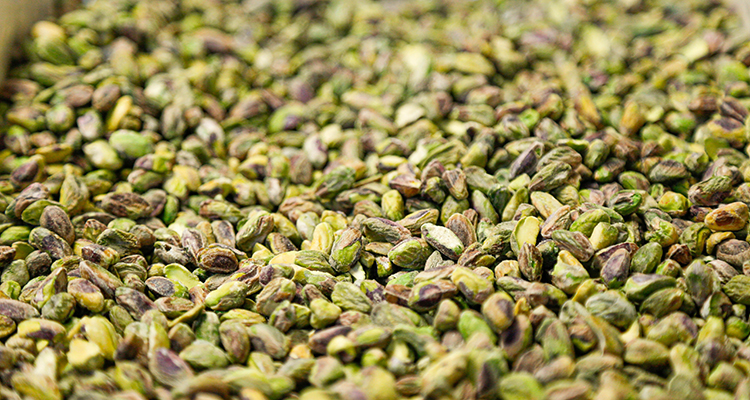
Magnesium
Magnesium is an essential mineral for healthy muscles and bones, but it also promotes relaxation and can help both your mind and body prepare for sleep by activating your body’s parasympathetic nervous system. Research suggests including enough magnesium in your diet can also regulate your heart rate and blood pressure, all of which promote overall health, well-being, and sleep quality. Pistachios contain 40% more magnesium than other seeds and nuts including cashews and almonds, which is why, if you suffer from insomnia, these seeds deserve a spot in your regular diet.
B6
Pistachios contain more B6 than any other nut or seed. This nutritious vitamin supports a healthy nervous system and also promotes high energy levels during the day, which may help you sleep better at night. Vitamin B6 also plays an important role in producing both melatonin and serotonin, which support restful deep sleep and a balanced mood. Countless studies show a connection between depressive disorders and sleep issues, including insomnia. By addressing depression, stress, and anxiety, you may also experience improved sleep quality. Pistachios, which contain high levels of B6, can help with this.
Tips for Incorporating Pistachios Into Your Diet
Whether you love them or hate them, there’s no denying the many benefits that pistachios offer for your health, sleep, and overall well-being. Here are a few creative ways to include them in your daily diet so you can reduce stress and catch some much-needed Zs.
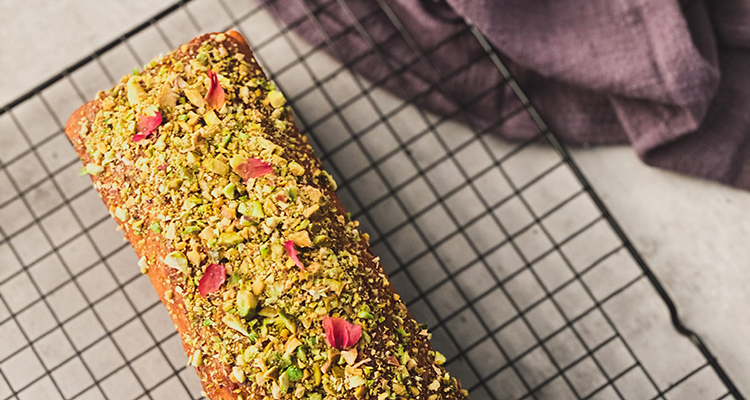
Eat them as a Snack
If you like pistachios, this is a no-brainer. Eat them raw, roasted, or over a salad. Most people who like the strong, earthy flavor of pistachios prefer to eat them as nature intended. Pop a few in your mouth as a sweet treat before bed or have them with breakfast or lunch. You can really enjoy this seed any time of the day and the benefits will carry over into the night, but for the greatest effects, consume your daily dose of pistachios within a few hours of laying down at night.
Try Delicious and Creative Recipes
For those who aren’t a huge fan of how raw pistachios taste, there’s good news. With a little practice and know-how, you can incorporate these beneficial seeds into some pretty creative and delicious recipes. From desserts and smoothies to salads, bread, ice cream, and even pasta sauce, pistachios are a versatile food that can easily be masked by other strong flavors. Check out this page for the best and easiest pistachio recipes.
Add them to Your Nighttime Routine
You should incorporate pistachios into your daily routine the same way you do other healthy habits like taking a multivitamin and exercising. Creating a wind-down routine at night is a great way to help align your body’s circadian rhythm and improve both sleep quality and sleep duration. When you start your nightly routine, add pistachios to the schedule. For example, take a soothing bath, meditate, and then eat a handful of pistachios while you enjoy a hot cup of herbal tea or write in your sleep journal. Before long, eating pistachios before bed will become second nature.
Document Sleep Improvements
Speaking of a sleep journal – the only way to really determine if pistachios are benefiting your sleep patterns is by documenting them. Mark down what time you go to sleep, what time you wake up, and how often you wake up during the night. After a few weeks of eating pistachios as part of your regular diet, see if this data changes or improves. If so, then you know your body is responding positively to this nutrient-rich superfood.
Other Foods that Promote Quality Sleep
As amazing and versatile as pistachios are, they aren’t the only food proven to help you sleep better at night. Here are a few other sweet treats you can add to your diet to help ease insomnia symptoms.
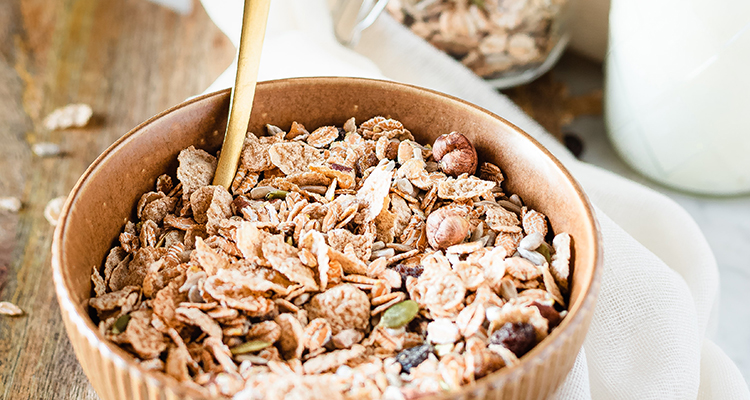
Cherries
Cherries also contain melatonin, which can help regulate your sleep-wake cycle and make it easier to fall asleep faster and stay asleep longer. But that’s not all. Cherries are also packed with magnesium, vitamin C, copper, and potassium which are all said to strengthen your immune system and improve overall health. Other benefits of cherries include a reduced risk of heart disease, stronger and healthier hair, lower blood pressure, and reduced inflammation. If chronic pain is keeping you up at night, cherries might help!
Figs
Looking for foods packed with magnesium and potassium? Look no further than figs! Not only does this sweet treat help reduce muscle aches but it also increases circulation. Figs are packed with fiber, which is proven to help you stay fuller for longer and regulate your metabolism. That means eating figs close to bedtime could help curb those nighttime cravings. Studies also suggest that poor sleep and sleep disorders may negatively impact your metabolism, leading to weight gain and other health complications. Figs also contain calcium, manganese, zinc, and vitamins A, C, K, and B9! Other added benefits include weight loss and reduced cholesterol.
Bananas
Bananas have long been hailed as a delicious superfood that you can add to just about any snack or meal. They’re also a favorite snack of athletes and runners and for good reason. Bananas help ease muscle cramping thanks to their high levels of magnesium and potassium. But the benefits don’t end there. The muscle relaxation offered by bananas may also ease insomnia symptoms and help you achieve better, deeper sleep.
Bananas also contain the important compound tryptophan, which your body converts to serotonin and uses to regulate your mood, appetite, digestion, and sleep. By balancing your circadian rhythm, bananas and their beneficial nutrients help regulate your body temperature, keeping you cool and comfortable all night long.
Prunes
When people think of prunes, they usually think of gut health and digestion. While prunes can help ease stomach discomfort caused by constipation, they offer many other benefits including high levels of B6, magnesium, calcium, and melatonin. All of these nutrients are proven to improve sleep and ease symptoms associated with insomnia and other common sleep disorders. They also have a high fiber content, helping keep you full until morning. Prunes are high in iron content as well, improving anemia in some people. You may also notice stronger muscles and bones and lower blood pressure after incorporating these dried plums into your diet.
Oats
If you love all things oats, you’re in luck. Oats are packed with calcium, and magnesium, and are considered a natural source of both tryptophan and melatonin – two key components involved in achieving quality sleep. Pair your oats with milk for an added boost of calcium and tryptophan! Similar to other foods on this list, oats will keep you full and satisfied all through the night.
Other active ingredients include vitamins B1 and B5, copper, zinc, iron, folate, manganese, and phosphorus. Oats also contain small amounts of B3 and B6, as well as potassium for muscle recovery and strength. Enjoy the added benefits of healthy blood sugar levels, reduced risk of heart disease, and lower cholesterol levels.
Almonds
Do you enjoy the taste of nuts but aren’t a big fan of pistachios? You can swap these green treats for almonds instead and still experience the benefits. Almonds are chock full of magnesium which helps relax muscles and promote comfortable sleep. Almonds also contain tryptophan to help balance your heart rhythm and support nerve function.
Some studies show that almonds help reduce depression and anxiety symptoms that can cause sleep disturbances. These nuts are also packed with antioxidants that can help lower your blood pressure. Almonds may also prevent certain cells in the body from aging prematurely while also reducing your risk of developing oxidation-related diseases.
FAQs About Pistachios and Sleep
If you’re still wondering if pistachios can really help you sleep, check out these frequently asked questions about this green, nutritious seed.
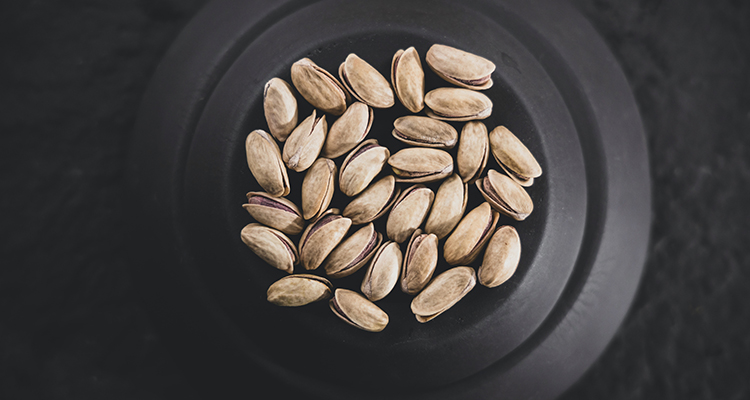
How many pistachios do I need for sleep?
You already know that the melatonin, serotonin, tryptophan, and magnesium in pistachios can help ease insomnia symptoms, but exactly how many pistachios must you consume to feel the effects?
Studies show that just half a cup of pistachios eaten before bed can deliver some pretty impressive results. This equates to approximately 2 ounces or 20 to 30 nuts. Sleep specialists also explain that melatonin levels peak between 2:00 and 4:00 in the morning when your body is programmed to achieve its deepest stage of sleep. To experience the greatest benefits of the melatonin contained in pistachios, have your snack between 6:00 and 9:00 pm when melatonin levels are on the rise. You can also add some almonds or walnuts to your nighttime snack for an added dose of tryptophan.
How soon before bed should I eat pistachios to experience the benefits?
Doctors recommend that you consume pistachios approximately 90 minutes before bed when your body’s natural melatonin production kicks into gear. Melatonin levels usually start to rise around mid-to-late evening after the sun sets and your internal clock recognizes it’s time to prepare for sleep. Give your body at least 60 minutes to digest the pistachios before laying down to prevent an upset stomach or indigestion.
Are pistachios good for you?
Aside from just easing insomnia symptoms, pistachios offer a variety of other health benefits. As previously mentioned, seeds are packed with fiber, antioxidants, B6, magnesium, and unsaturated fats. Research on the benefits of pistachios dates back to 1942 when the seeds were used to treat hypertension and improve gut health. They were also discovered to be a good source of vegetable protein and essential amino acids.
How nutritious are pistachios compared to other nuts and seeds?
When compared to other nutritious nuts like walnuts and almonds, pistachios are one of the healthier options thanks to their high levels of vitamin B6, fiber, and essential amino acids. Compared to other nuts and seeds, pistachios also contain high levels of protein, lysine, and healthy fats including oleic acid, which may reduce cholesterol levels in some people. The nut’s healthy dose of vitamin B6 supports a healthy nervous system and energy levels.
When it comes to protein, pistachios top the list with 6 grams per serving. They’re also high in fiber, providing 3 grams of fiber per serving. If you want a nut that delivers it all, look no further than the deliciously sweet and earthy pistachio.
Do pistachios promote weight loss?
Melatonin does more than just promote sleep. Studies show that it may also lead to fat loss. Considering obesity is a leading cause of sleep apnea and other sleep disorders, a healthy metabolism could inadvertently improve your sleep quality. Melatonin acts as a powerful antioxidant, protecting your cells from damage and promoting cellular regeneration.
Pistachios also contain Phytosterol, a compound known for its ability to lower cholesterol levels and increase both protein and fiber in your diet, which can help keep you fuller for longer. The melatonin in pistachios may also inhibit fat production, accelerating the breakdown of triglycerides in the liver and adipose tissue.
Boost Your Diet and Your Sleep Health
Incorporating pistachios into your diet can offer both a boost in your overall health as well as your sleep quality. Packed with melatonin, magnesium, vitamin B6 and numerous other nutrients and antioxidants, pistachios consumed approximately 90 minutes before bed might help reduce sleep latency while increasing sleep quality and duration.
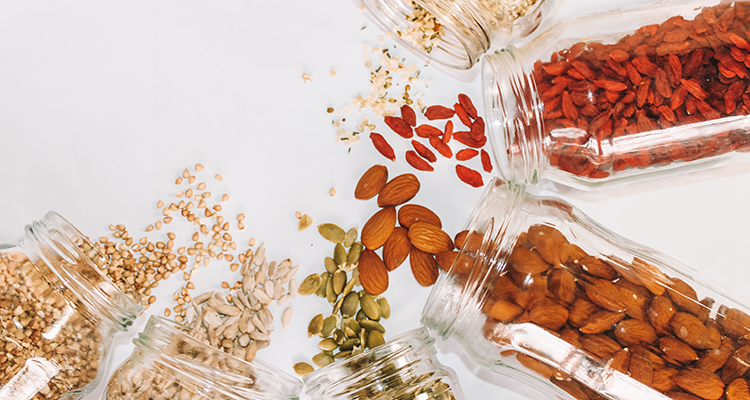
Looking for more healthy and holistic ways of easing insomnia symptoms and improving your sleep habits? Click here to learn how Somnus Therapy’s online sleep therapy program can help.















